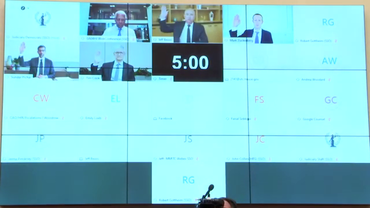The big four
 "Companies aren't bad just because they're big," Mark Zuckerberg told the US Congress ten days ago, though he failed to suggest aspirational counterexamples. Of course, the point isn't *that* a company is big - but *how*.
"Companies aren't bad just because they're big," Mark Zuckerberg told the US Congress ten days ago, though he failed to suggest aspirational counterexamples. Of course, the point isn't *that* a company is big - but *how*.
July 28, 2020 saw Zuckerberg, Jeff Bezos, Tim Cook, and Sundar Pichai lined up to face the House Judiciary committee in a hearing on Online Platforms and Market Power. As so often these days - and as Julia Angwin writes at The Markup, Democrats and Republicans (excepting Kelly Armstrong, R-ND), conducted different hearings. Both were essentially hostile. Democrats plus Armstrong asked investigative journalism-style questions about company practices, citing detailed historical examples: unfair competition, abuse of a dominant position (Apple, Amazon), editorial manipulation (Facebook, Google), past acquisitions, third-party cookies (Google), targeted advertising, content moderation, hate speech, Russian interference in the 2016 election (Facebook), smart speakers as home hubs (Amazon), counterfeit products (Amazon), and so on for five and a half hours. Each of the four, but particularly Cook, spent a fair bit of time waiting through other people's questions. Overall response: this stuff is *hard*; we're doing a *lot*, we have lots of competition, while their questioners fretted at the loss of every second of their limited time. It must be years since any of these guys has been so frequently peremptorily interrupted while waffling: "Yes or no?"
The Markup kept a tally of "I'll get back to you on that": Bezos edged out Zuckerberg by a hair. (Not entirely fair, since Cook had many fewer chances to play.)
At one point, Pramila Jayapal (D-WA) explained to Bezos that the point of the committee's work was to ensure that more companies like these four could be created. (Maybe start by blocking Google from buying Fitbit.) She was particularly impressive asking about multi-sided markets and revenue sharing, and also pushed Zuckerberg to quickly implement the recommendations in its recent civil rights audit (PDF). But will her desired focus be reflected in the final report, or will it get derailed by arguments over political bias?
Aggrieved Republicans pushed hard on their claim that social media stifles conservative voices, perhaps not achieving the effect they hoped. Jim Sensenbrenner (R-WI) asked Zuckerberg why Donald J. Trump Jr's account was suspended (for sharing a bizarre video full of misinformation about the coronavirus). Zuckerberg had to tell him that was Twitter, although Facebook did remove that same video. Greg Steube (R-FL) demanded of Pichai why Google sorted his campaign emails into his parents' spam folder: "This appears to only be happening to conservative Republicans." (The Markup has found this is non-partisan sorting of "marketing" email, and Val Demings (D-FL) noted it happens to her.) Steube also claimed that soon after the hearing was agreed conservative websites had jumped back up out of obscurity in Google's search results. Why was that? While Pichai struggled to answer, someone quipped on Twitter, "This is everyone trying to explain the Internet to their parents."
Jim Jordan (R-OH), whose career aspiration is apparently Court Jester, opened with: "Big Tech is out to get conservatives - that is a not suspicion, not a hunch, it's a fact." He reeled off a list of incidents and dates: the removal of right wing news website Breitbart, donations from Google employees to then-presidential-candidate Hillary Clinton in 2016, and Twitter removing posts from Donald Trump calling for violence against protesters, and claimed he'd been "shadowbanned" when Twitter (still not present) demoted his tweets to make them less visible, adding that he tried to call Twitter CEO Jack Dorsey as "our" witness. Was Google going to tailor its features to help Joe Biden in the upcoming election? "It's against our core values," said Pichai. Jordan pounced: "But you did it in 2016." He had emails.
Matt Gaetz (R-FL) also seemed offended that - as an American company - Google had withdrawn from the Department of Defense's Project Maven and asked Pichai to promise the company would not withdraw from cooperating with law enforcement, accusing the company of "bigoted, anti-police policies". Gaetz was also disturbed by Google's technical center and collaboration on AI in China - a complaint seemingly pioneered by Peter Thiel..
Steube also found time to take a swipe at the EU: "It's no secret that Europe seems to have an agenda of attacking large, successful US tech companies, yet Europe's approach to regulation in general, and antitrust in particular, seems to have been much less successful than America's approach. America is a remarkable nursery for market innovation and entrepreneurship in pursuit of the American Dream." The irony of saying this while investigating the resulting monopoly power appeared lost on him.
In their opening statements, all four CEOs had embraced only-in-America. At last week's gikii, Chris Marsden countered with this list of technology inventions by Europeans: the Linux kernel (Finland); the Opera browser (Norway), Skype (Estonia); the chip maker ARM (UK), the Raspberry Pi (UK); the VLC media player, and an obscure technology called the World Wide Web (UK, working in Switzerland). "Social good," Marsden concluded, "rather than unicorns". Some of those - Skype, ARM, Opera - were certainly sold off to other parts of the world. But all of the big four have benefited from at least one of them.
Illustrations: Jeff Bezos, Mark Zuckerberg, Sundar Pichai, and Tim Cook are sworn in via Webex.
Wendy M. Grossman is the 2013 winner of the Enigma Award. Her Web site has an extensive archive of her books, articles, and music, and an archive of earlier columns in this series. Stories about the border wars between cyberspace and real life are posted occasionally during the week at the net.wars Pinboard - or follow on Twitter.